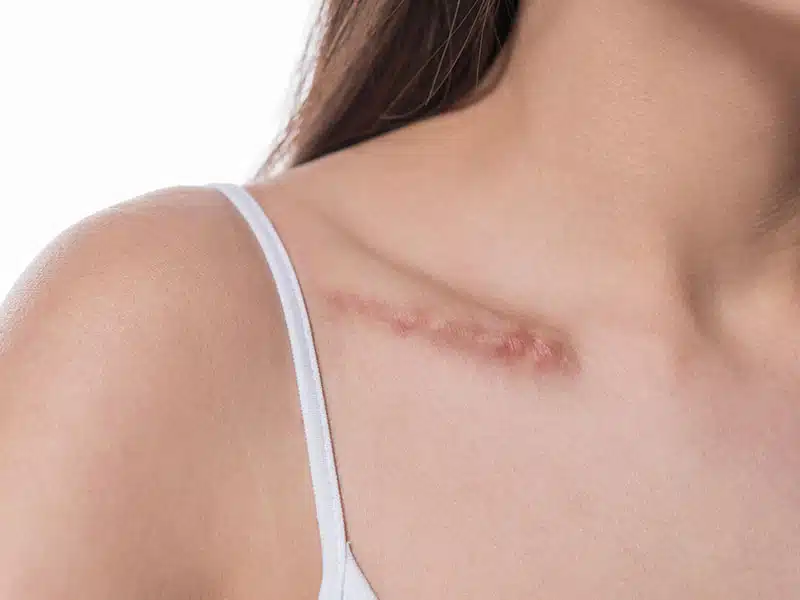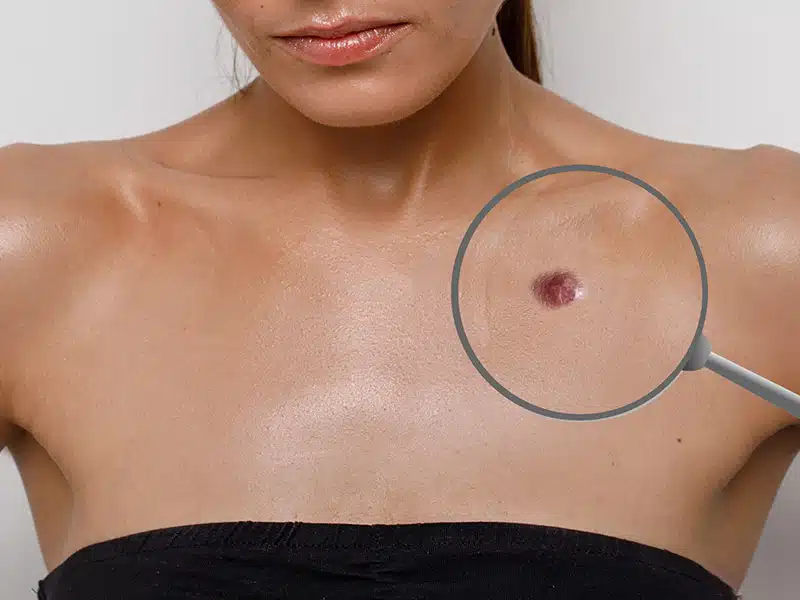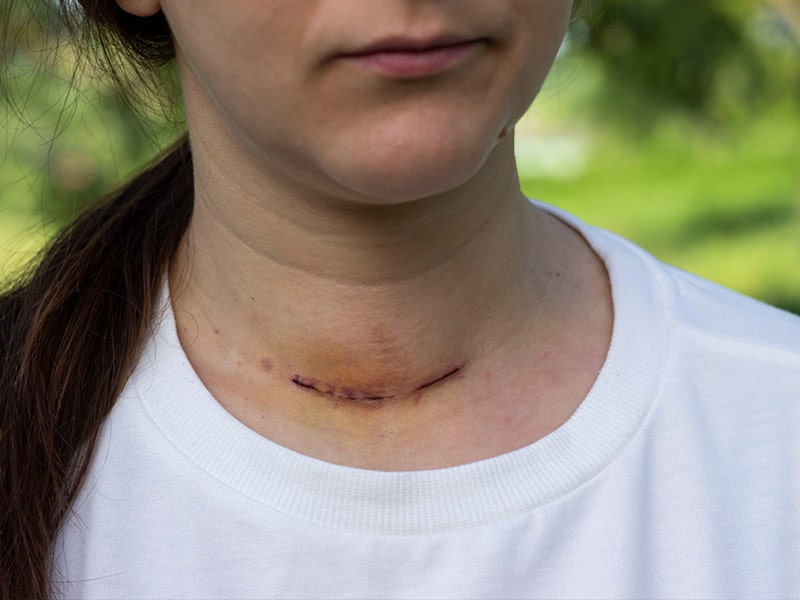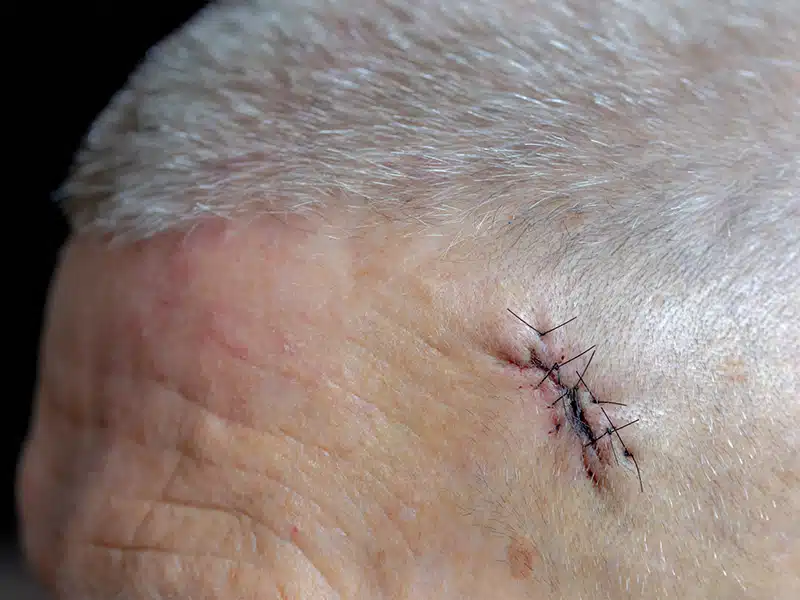Facial Skin Cancer Reconstruction in New Jersey & Philadelphia
Home » Procedures » Skin Cancer Reconstruction
Skin cancer is the most prevalent form of cancer in the U.S., with approximately one in five Americans developing skin cancer by the age of 70. The most common types of skin cancer are basal cell carcinoma, squamous cell carcinoma, and melanoma. The treatment of skin cancer varies based on the type, stage, location, and overall health of the patient. Surgery is one of the most common treatment options for skin cancers, with numerous surgical methods available. For skin cancers of the face, Mohs micrographic surgery (“Mohs surgery”) is often recommended. This technique involves removing the skin cancer layer by layer and examining each layer under a microscope until no cancer cells remain. This is a highly effective approach to remove skin cancer while sparing as much of the normal surrounding tissue as possible, particularly in cosmetically important areas such as the face.

Experience the Excellence of Dr. Yamasaki, Harvard-Trained Facial Plastic Surgeon.
Upon successful removal of skin cancer, reconstructive surgery is necessary. Harvard-trained Facial Plastic Surgeon Dr. Alisa Yamasaki, MD, is an expert in skin cancer reconstruction in New Jersey & Philadelphia at Yamasaki Facial Plastic Surgery. She has written articles and book chapters on the topic and has extensive expertise in facial reconstruction. Dr. Yamasaki sees patients in her New Jersey and Pennsylvania offices, utilizing state-of-the-art techniques to perform reconstructive surgery after facial skin cancer removal. She will recommend the reconstructive option that best restores the affected area’s normal form and functional while minimizing disfigurement and scarring. Dr. Yamasaki collaborates with several Mohs Surgeons/dermatologists who remove the skin cancer before she proceeds with specialized skin cancer reconstructive surgery. In these cases, Dr. Yamasaki will work directly with your Mohs surgeon/dermatologist to coordinate the logistics of scheduling your reconstructive surgery after Mohs skin cancer removal.

What is Skin Cancer Reconstruction?
The removal of skin cancer or precancerous lesions typically requires that a portion of healthy skin around the affected area be removed. If a skin defect is left to heal on its own, it can lead to unsightly scarring, skin tethering, and functional abnormalities of the involved soft tissue. Reconstruction is therefore an integral part of restoring both the structure and function of the face after skin cancer removal.
Skin cancer reconstruction can be complex. Defects can be reconstructed using surrounding tissue with its native blood supply intact (e.g., local flap, regional flap) and/or borrowed tissue from a completely separate location (e.g. skin graft, cartilage graft).The location and size of the skin cancer defect will typically determine the extent of reconstruction and the surgical approach.
Dr. Yamasaki has extensive experience in repairing many different types of skin cancer defects of the face and neck. She uses a combination of technical precision and artistry in her approach to reconstruction. During a consultation with Dr. Yamasaki, she will determine the specific treatment plan that will achieve the best possible cosmetic and functional outcome for her patients.
Benefits of Skin Cancer Reconstruction
01
Reduce the appearance of scars and improve a patient's overall appearance
02
Restore symmetry to facial treatment areas like the nose, cheeks, eyelids, lips, and ears
03
Ensure that areas impacted by skin cancer will maintain as much functionality as possible
04
Provide the option of in-office or OR-based reconstructive, depending on individual patient factors
Skin Cancer Reconstruction Consultation
During the consultation, Dr. Yamasaki assesses the patient’s specific anatomy as well as the anticipated defect size, depth, and location in order to determine the best skin cancer reconstruction that is tailored to the individual patient. In cases when there are multiple reconstructive options, she will discuss the logistical considerations, risks, and benefits of each option to help you determine which approach will be best for you.
She also reviews the anticipated result, potential risks,, individual considerations, and surgical aftercare. Her ultimate objective is for the patient to feel comfortable and confident in their procedure and outcomes. Photos will be taken before and after the consultation for skin cancer reconstruction to continue to monitor your recovery from the procedure and long-term progress.

If you are planned to undergo a Mohs procedure with a Mohs surgeon/dermatologist, Dr. Yamasaki will work closely with your dermatologist to communicate any results or clinical notes that are needed prior to your procedure. She will also collaborate with your dermatologist to schedule your procedure and coordinate the logistics to ensure the process is as smooth as possible.
If you have previously undergone skin cancer reconstruction and are not happy with the scar, Dr. Yamasaki also provides consultations for scar revision surgery.
You won't regret
booking Dr. Yamasaki
“Dr. Yamasaki is incredible. She’s a physician that genuinely cares about her patients. From the moment she stepped in to the room, she was extremely diligent, comforting, and never made me feel rushed. She explained everything in great detail and went above and beyond in our appointment. It was refreshing to be seen by a physician that genuinely cares and is sympathetic to patient issues. If you’re thinking about seeing Dr. Yamasaki or interested in seeing her, don’t think twice. Book an appointment. You won’t regret it.”
Jonathan Harper
The Ideal Candidate for Skin Cancer Reconstruction
If you are planning to undergo skin cancer excision/Mohs micrographic surgery, it is best to schedule a consultation with a plastic surgeon prior to your surgery in order to understand your reconstructive options. Patients who are non-smokers and without major medical problems tend to have the best chance of having an excellent reconstructive outcome with a lower risk of postoperative complications. Patients who have realistic expectations of surgery and keep an open-mind to all options will also have the greatest array of treatments available to achieve the best possible result.

Preparing for Skin Cancer Reconstruction
Dr. Yamasaki will review specific pre-procedure instructions with you, which she recommends for patients in order to optimize outcomes and minimize complications during facial skin cancer reconstruction surgery. These instructions may include:
- Smoking cessation 4-6 weeks prior to surgery and 4 weeks after surgery
- Stopping blood thinning medications or supplements prior to surgery, depending on the type of medication and your medical risk factors (this will be discussed with you on a case-by-case basis)
- Avoid sun and UV exposure before and after your surgery to avoid skin discoloration and ensure optimal skin healing.
- Avoid drinking alcohol at least 24-48 hours before your surgery.
- Arranging post-surgery transportation with a friend or a loved one in cases when you cannot drive yourself home after surgery (this will be discussed with you on a case-by-case basis)
Before & After Skin Cancer Reconstruction
The Skin Cancer Reconstruction Procedure
After all the cancer cells are removed by a Mohs surgeon/dermatologist, Dr. Yamasaki will begin working with you to reconstruct the defect. Facial skin cancer reconstruction is a complex process that involves several steps to ensure that a patient’s appearance and function are restored as best as possible after the skin cancer is completely excised. The specific reconstructive steps can vary based on the size, location, and type of skin cancer, as well as the patient’s health status and personal preferences. This process is especially important for sensitive facial areas such as the lips, nose, or ears.
Timing of Reconstruction

Reconstructive Techniques
Several different reconstruction techniques can used applied, depending on the size and location of the defect:
- Simple Primary Closure: Simple suturing of the wound if the defect is small.
- Skin Grafting: Borrowing skin from another part of the body to cover the defect.
- Composite Grafting: Using a combination of different tissue types (e.g. skin, cartilage, fat, fascia) for a layered reconstruction.
- Local Flap: Moving adjacent tissue to cover the wound, which is advantageous because it maintains a similar color, texture, and blood supply.
- Free Flap: Detaching and transferring tissue from a distant site–along with its blood supply–to the facial area.
Skin Cancer Reconstruction Recovery
During the consultation and procedure, Dr. Yamasaki provides each patient with instructions regarding the recovery process after surgery. It is important to follow the instructions in order to maximize your results and ensure you have the best possible outcome. Dr. Yamasaki’s office is always available if patients have questions. It is also important to maintain a healthy lifestyle with a well-balanced diet, good hydration, adequate sleep, and smoking avoidance, as these factors can influence your surgical healing.
Postoperative Care
Follow-Up Care
Dr. Yamasaki will work with you to ensure you have the appropriate follow ups needed to evaluate the surgical site, ensure the appropriate progression of wound healing, and assess other aesthetic and functional improvements of the reconstruction. She will also work with you to determine if any additional procedures may be needed. Depending on the extent of the initial reconstruction and the type of repair required, additional staged reconstructive procedures may be required to achieve optimal results.
Skin Cancer Reconstruction Cost
Skin cancer reconstruction is considered a medically necessary procedure and is therefore typically covered by insurance. The exact cost of a patient’s skin cancer reconstruction surgery depends on your insurance plan and the specific coverage details for the type of surgical repair that is required. Dr. Yamasaki’s office will work with you to help determine your insurance benefits and will guide you through the process of obtaining insurance approval for your reconstructive procedure.
Why Choose Dr. Alisa Yamasaki for Facial Skin Cancer Reconstruction?
- Renowned Expertise: Double Board-certified and fellowship-trained, Dr. Yamasaki is a top specialist in otolaryngology and facial plastic surgery.
- Prestigious Affiliations: Dr. Yamasaki’s association with Penn Medicine and her experience at top institutions like Harvard and the University of Michigan ensure multidisciplinary, superior care.
- Personalized Patient Care: Every reconstruction is tailored to preserve facial harmony while ensuring optimal healing and aesthetic results.
- Advanced Reconstructive Techniques: From Mohs reconstruction to complex grafting, Dr. Yamasaki utilizes cutting-edge methods for natural-looking outcomes.
- Proven Results: Patients trust Dr. Yamasaki for her meticulous approach, achieving seamless, confident restoration after skin cancer removal.

Dr. Alisa Yamasaki, MD, is a Harvard-trained and double board-certified Facial Plastic and Reconstructive Surgeon specializing in facial skin cancer reconstruction. With extensive expertise in restoring both form and function, she has authored multiple book chapters on the topic.
If you’re seeking expert care for skin cancer reconstruction, schedule a consultation at Yamasaki Facial Plastic Surgery in New Jersey & Philadelphia.
Common Skin Cancer Reconstruction Questions
What can I expect during recovery from my facial skin cancer reconstruction?
Recovery from facial skin cancer reconstruction can vary depending on the type and extent of the surgery performed. In general, it is fairly common to experience temporary swelling and bruising around the surgical site for the first few weeks. You may have some mild pain and soreness to the surgical site. Many patients feel the pain is not significant enough to warrant medication, but if needed, over-the-counter medications such as acetaminophen (Tylenol) may be used. It is typically recommended to avoid strenous activities following surgery. If you require a dressing, Dr. Yamasaki will provide you with specific instructions for this. You may notice some numbness and sensation changes at the surgical site, which is common and usually resolves over time.
Over time, the surgical site will heal and a scar will form. Scar formation is a natural part of the healing process. Dr. Yamasaki will guide you through the surgical healing process to ensure that you have the best possible result.
When will I see my skin cancer reconstruction results?
Over the course of the first 2 to 4 weeks, you will gradually notice an improvement in the swelling and incision redness that are a normal part of the healing process. By 4 to 6 weeks, much of the swelling and bruising should diminish, and you will. This is when you will begin to see the repair take shape. Over the course of the first 3 to 6 months months, you will experience progressive improvement in the surgical site contours as the scar matures and the incisions continue to lighten and fade. By 6 to 12 months, the repair has stabilized and the reconstruction will be close to its final form. Skin healing may continue to evolve for one year or more after surgery. Occasionally, minor adjustments or additional procedures may be needed to achieve the best possible results.
Is skin cancer reconstruction right for me?
If you have been diagnosed with facial skin cancer, you may be a candidate for facial skin cancer repair. This can be coordinated with your skin cancer removal, depending on the details of your case. Schedule a consultation with Dr. Yamasaki at Yamasaki Facial Plastic Surgery to find out more.
What areas of the body can undergo skin cancer reconstruction?
Skin cancer reconstruction can be performed on any part of the body, including the face, scalp, neck, hands, and other areas. The techniques used are tailored to match the specific location and unique needs of each patient.
Are there risks associated with skin cancer reconstruction?
As with any surgery, there are risks such as infection, scarring, or asymmetry. However, these risks are minimized with proper surgical technique and aftercare, and most patients achieve successful outcomes.